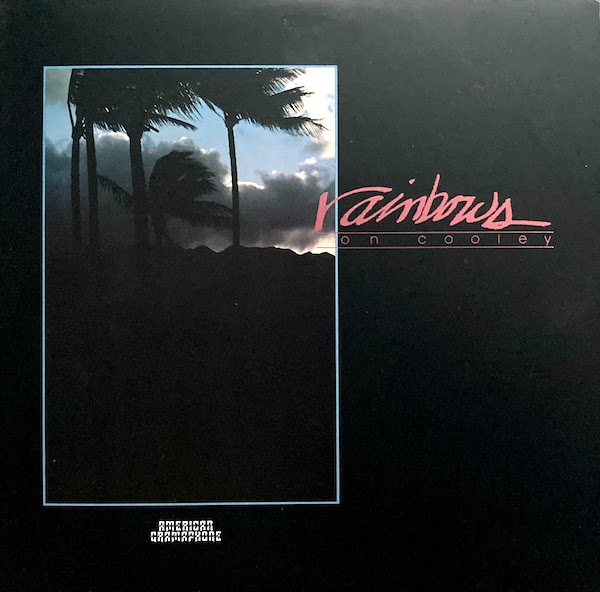
♫♩♩♪♫?…just more of that hammock music. You know me, if you’ve followed this site for a while, you’re probably aware by now how this is the time of the year I dedicate to promoting my favorite easy-going music. Usually instrumental, completely breezy and tropical, it follows a trend I believe in. It’s about thinking of music as cyclical or better put: seasonal. Just imagine listening to Ron Cooley’s Rainbows in the dead of winter. Unless you’re in the mood for torturous nostalgia, this is music made for the warmer environs of the dog days of summer saddled somewhere close to a body of water.
Looking back at it, Rainbows truly checks all the marks found in records that figuratively scream “Balearic” in their metadata. Created by a little-known, talented session guitarist. (Check.) Sunset-tinged album cover design. (Check.) Loads of strummed, major 7th chords. (Check.) Cheap heat — priced to move. (Check.) Recorded in the middle of nowhere. (Check.) Rose-tinted track and album titles. (Check and double-check.) It’s the why, of course, that makes it worth your time.
Ron Cooley grew up in Omaha, Nebraska where his parents moved after finishing their studies in South Dakota. A military brat, Ron was supposed to follow in the footsteps of his dad into the Army but as with the case of most boomers born after World War II, Ron chose to follow his muse elsewhere and turned into counterculture.
As a self-taught guitarist, Ron was unsurprisingly open to learning his craft. Early stints in overseas military bands gave way to more dedicated studies back in the states, in Boston, to study jazz and theory. When he returned to Omaha in the mid ‘70s, Ron befriended keyboardist Chip Davis and was invited to play with him as part of C.W. (Call Me ‘Rubber Duck’) McCall’s, of “Convoy” fame, ‘Fort Calhoun Nuclear Power Plant’ band.
Learning the ropes of the “long-hauling road” that comes from professional gigs created the side-effect of learning all sorts of music that would normally be outside everyone else’s wheelhouse. Playing country, funk, jazz, and classical music, whatever the next job required, made Ron’s next move seem logical.
It was Ron’s relationship with Chip Davis that would open other doors for him, eventually leading him to become the solo artist you see here. Building on the success of Chip Davis’s Mannheim Steamroller, the grandiose “modern classical” cum New Age group, Ron was one of their first signings to their fledgling independent record label, American Gramaphone Records.
In that weird milieu when American New Age labels like Windham Hill rose to provenance, so too were labels like Chip’s American Gramaphone promising audiophile-quality records that could show off the dynamics of your stereo setup with music that was unfussy, made by musicians that fell outside genres. What was basically an excuse to remain refreshingly independent as “Mannheim Steamroller” eventually would yield thoroughly midwestern-sounding ambient music from the likes of Richard Burmer, Paul Winter, and Doug Smith, to name a few.
One can’t help and parse out the many moods that make up the music of Rainbows. Harmonically-rich, fingerstyle, country-picking crowns its opening track, “Morning Rain”. Then all of that segues into the slack key gorgeousness of the open road-ready of the title track. Somewhere, Ron would name-check influences like Miles Davis, Coltrane, Wes Montgomery, McLaughlin’s Mahavishnu Orchestra, and George Benson. Taking out a few of the names, Mr. Benson and John McLaughlin, seems to me, that’s the spirit terrain of the music Ron would cover here.
Ron’s debut, 1980’s Daydreams already signalled some sort of next-gen easy listening that he was uniquely capable of. Two years later, in Omaha, joined by a bunch of Mannheim Steamrollers, Ron seemed to refine that vision even further, creating even more impressionistic music. Seemingly inspired by myriad aquatic scenery and island moods, Ron augmented his guitar stable with electronic synthesis and went for wonderfully complex feel-good music for those “stuck” on the islands of Maui and Kauai.
If you’re a sucker for genuinely arresting wine glass music like me, you’ll appreciate the snaky latin jazz of songs like “Hourglass”. Attempts at delicate New Age on songs like “Turtle Doves” brings out a certain subdued Mannheim Roller-esque arrangement that works to Ron’s esoteric playing. And if you’re a sucker for more wistful open-road songs, there will be some like “Sunrise” that bring out the cornhusker-on-Coltrane vibes and others like “Watercolours” that signal a certain paliege with one Mr. Metheny (who shared a similar aesthetic at one time), showing how Ron could pull off such stylings with ease.

It’s that ease that does just enough to keep you playing through its 30-odd minute length, wondering if there’s any more daylight one can squeeze out of today (and this music). As for me, don’t mind me, I’m just breezin’ to this one.
